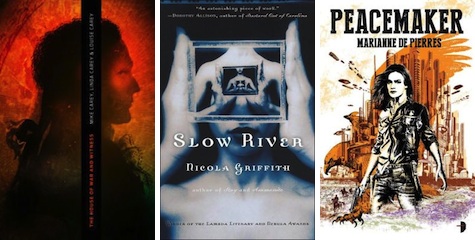What have I read lately that’s good? Or at least fun? Let me tell you about it!
I haven’t been reading as much as I’d like to, which most likely just goes to show how much I’d like to. But there are eight books I’d like to draw to your attention in this column, though—even if two of them were part-authored by a bloke.
Mike Carey, Linda Carey, and Louise Carey have written two books together thus far, and their combined talents are sufficiently impressive that I hope they collaborate on a great many more. The City of Silk and Steel (Gollancz, 2013; published in the US under the much less appropriate title The Steel Seraglio) and The House of War and Witness (Gollancz, 2014) are excellent novels, structurally playful, with a deep thematic interest in storytelling and stories, and a diverse array of compelling characters. (And a wide array, particularly in The City of Silk and Steel, of female characters, all of whom are treated with immense empathy and understanding.)
The good people at DAW were kind enough to send me an advance copy of Seanan McGuire’s The Winter Long (forthcoming in August). This is another hectic ride in the adventures of Toby Daye, and lives up to the standards of previous instalments. But this time around, Toby learns some new Awful Truths about her family and her past, and an enemy believed dead, an enemy even the Luidaeg fears, has returned and is gunning for Toby and her people. Breakneck and with a lot of boom, The Winter Long closes with some unanswered questions—clearly setting up some things to cause trouble for Toby in future volumes.
Richelle Mead’s Gameboard of the Gods and The Immortal Crown (Penguin, 2013 and 2014 respectively), started out interesting, in an SFnal future where religion is tightly controlled as “belief in fictional entities”—but gods actually exist, and have power, and are vying for control of the protagonists. Alas, a promising start dissolves into confusion and worldbuilding* that never quite makes sense, and Mead’s rapid pacing doesn’t quite conceal the incoherence of her structure. On the other hand, if you turn your brain off—and have a higher tolerance than I do for Norse mythic imagery—they can be fun.
*At times the worldbuilding ventures into pretty problematic territory, particularly in The Immortal Crown.
Nicola Griffith’s Slow River (Gollancz) is an old book, but an excellent one. Quiet, intense, spare and deeply affecting, it’s a novel I think everyone should read …Only please don’t ask me to describe it, because I’ll break down in inarticulate flailing and the !!! of enthusiasm. Relationships! Never crossing the same river twice! Being destroyed and becoming yourself again! People! Read this book!
Michelle Sagara’s Cast in Flame (Mira) is the next instalment in her Chronicles of Elantra series. Kaylin is back in the city, but her problems never seem to end. This time it’s house-hunting with the world’s last female Dragon for a roommate; young immortal Barrani who are no longer exactly either young or, precisely, Barrani anymore, and a threat from the menace that dwells at the twisted heart of the city, beyond the fiefs. The Chronicles of Elantra’s trademark tension and banter is in full swing here, for a fast-paced adventure—one that ends on something of a cliffhanger.
Marianne de Pierres’ Peacemaker (Angry Robot) is another novel that combines science fiction and fantasy, but de Pierres manages her worldbuilding and her characterisation rather more successfully than Mead—even if she does seem to have employed the Magic Native American trope a little too close to its roots. Virgin Jackson, ranger in one of Australia’s last wilderness preserves, finds herself saddled with a hotshot American called Nate Sixkiller to help investigate a series of crimes that have been happening in her park. But there’s more to the crimes than first appears, and Jackson soon finds herself under suspicion of murder, seeing things that are logically impossible, and at the centre of a conspiracy that has implications for more than just her beloved wilderness. de Pierres has written a fast, compelling story: despite its small flaws, I really enjoyed reading Peacemaker.
And before I wrap this instalment of Sleeps With Monsters up: a special mention for Django Wexler, whose The Shadow Throne (Ace) is a second-world fantasy version of the French Revolution that features interesting women by the score—and includes a central, significant lesbian relationship.
What are you guys reading?
Liz Bourke is a cranky person who reads books. Her blog. Her Twitter.










